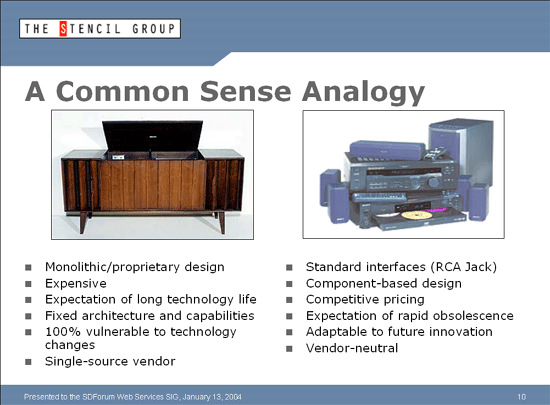| Service Oriented Enterprise |
|
Saturday, February 14, 2004 BEA on Web Services I largely disagree with the BEA position on web services: Now, of course, an intelligent app server can detect if the two services are local and bypass the marshalling. I think what BEA is saying is "our web services implementation isn't smart yet..." - and that's Ok. If you take BEA's advice - you'll likely end up with a tightly coupled, Java based application. Thus, you only integrated at the edges. I'm not a fan of this approach. Don't get me wrong - not everything should be a service - but saying, "you should place business logic in custom Java controls instead of web services" is definitely not my way of thinking! In my humble opinion, this is one of the faults with the WebLogic Integrator. It leads to 'inlining java code directly into the process code' - - which quickly turns into a mess. posted by jeff | 10:26 AM Friday, February 13, 2004 The Case for Orchestration Tooling As the Stencil Group points out, moving to a modular system has great benefits:  Now, if you were to look at the back side of the 'modular system' you would notice that there are wires running in every direction, hooking all of the modules (or services) together. If you've ever had to wire together the components in your stereo system, you know what kind of nightmare this can be.  The neat thing about monolithic systems is that they don't expose the ugly wires to the outside world. Of course, there is a huge downside in this approach as well - you're stuck with the whole elephant. The goal of orchestration is to get the best of both worlds: the flexibility of a modular system with the simplicity of a monolithic system. In most enterprises, you won't be dealing with a small handful of components, it will be hundreds, if not thousands of services that need to come together. Imagine trying to wire a stereo system with a thousand components... posted by jeff | 3:06 PM Service Types? I'm looking for some common vocabulary to describe the various nomenclatures found in service operations. Here is what I've been using: Pass-All Service This is a service that passes the verb and noun into a generic service entry point. An example would be: do( Add, Employee, EmployeeInfo) , or do("insert into Employee ...") Verb-Only Service This is a service that states the kind of action that will be requested in the operation name, but passes in the nouns. An example is Add(Employee, EmployeeInfo) Verb-Noun Service This is a type of service that states both the action and the nouns (the target of the actions) in the operation name. An example would be AddEmployee( EmployeeInfo ). Is there already terminology for these different interface styles? If so, please send me a note. posted by jeff | 6:22 AM Thursday, February 12, 2004 BPEL Data Mapping One of the early lessons that we learned was that data mapping between xml documents was a tough thing to do manually. BPEL leverages XPath extensively - thus to do it right, you need an integrated XML data mapping and XPath manipulation tool to facilitate the mapping between service calls. See: In the OpenStorm product this tool gen's the code for the 'Assign' tag based on drag & drop interfaces. We are finding that it significantly reduces the potential for syntax errors. It has also reduced the time to create complex orchestrations by about 40%. posted by jeff | 6:12 AM Tuesday, February 10, 2004 Web Service Documentation It is great to see that products are coming out to help document web services. This is another step in the maturity process. Now... we need people to learn how to write good documentation for their wsdl's and bpel's. Take a look at this: http://www.wsdox.com and the samples: http://www.wsdox.com/samples/index.html I'm very excited to see the BPEL documentation as well. The team as Wsdox are also planning on authoring guidelines about writing good documentation for web services. In addition to tooling, we need best practices. In my inquiry, they also mentioned some interesting notes about their roadmap including: documenting the WS-* aspects of services, making the tool a web service :-), documenting some of the other artifacts (XSL, XQuery, etc.) -- very good stuff. I'm also glad to see that they are OEM'ing the software - so many products should be using this kind of stuff... posted by jeff | 7:14 AM Sunday, February 08, 2004 The Twenty-Twelve Stack Patni issue oversubscribed 22 times Offshore software development continues to be hot for the investment community: The initial public offer (IPO) of Patni Computer Systems has been oversubscribed 22 times. The company is raising $95 million, which is the largest thus far by a software company in the last four years. In 1999, HCL Technologies had come out with $182 million issue. Amit Chandra, member of the board, DSP Merrill Lynch, said, The overwhelming response to the Patni book-built issue during the extremely choppy secondary market environment shows the strong investor appetite for high quality Indian paper. ... GE has a 10 per cent stake in Patni and relies on the US company for about 45 percent of its revenues. This is the company that my brother in GE Atlanta lost his job to. Way to go GE! Cut costs by replacing American workers with Indians, invest in Indian companies and help them go public! GE - you're one class act. Maybe they could take their proceeds and try to get that pesky law about freed slaves overturned. From: http://www.business-standard.com/today/story.asp?Menu=1&story=33841 posted by jeff | 7:08 AM |
|
|||||||||||||||
|
|
||||||||||||||||